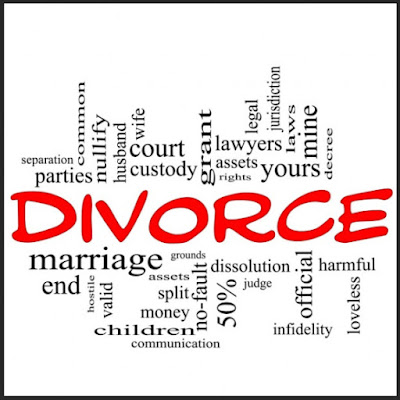Aftermath of divorcing at Malaysia : What will you get and what will you lose?
As divorce comes with an ambiguous loss,
children of divorced parents often experience an unclear traumatic pain which
can last for a lifetime. When custody is given to one parent, it physically
detaches the other parent toward leaving the family. This detachment will
eventually affect the relationship between parents and children. The severity
of the detachment becomes worse in many cases due to other consequences of
divorce like changing schools or living environments which in many cases can
take the child far away from the non-custody parents. This revealed that the
consequence of divorce and the deterioration of the parent-child relationship
could lead to intense feelings of grief in children. Children are often more
affected by the divorce than their parents.
However, in Malaysia, divorce has become
very common and the statistic showed an increasing rate of divorce from the
year of 2017 – 2018. The number of divorces increased 0.1 per cent from 50,314
(2017) to 50,356 (2018).
Divorce
Proceeding
There are
2 ways to begin a divorce proceeding, either by way of mutual consent or
unilateral petition. As a general rule, no petition for divorce can be filed
within 2 years of marriage unless it can be proven that the case is one of the
exceptional circumstances or hardship suffered by the petitioner.
Joint Petition
Section
52 of the Law Reform (Marriage and Divorce) Act 1976 (“LRA”) states that if the
husband and wife mutually agree that their marriage should be dissolved, they
may after expiration of 2 years from the date of their marriage present a joint
petition accordingly. The rationale of a divorce by mutual consent is
that where a couple mutually agrees that it is in the best interests that their
marriage be dissolved, the Court may upon satisfied of the same and that proper
provision is made for the wife and for the support, care and custody of the
children, if any, of the marriage, attach such conditions to the decree of
divorce as it thinks fit.
Unilateral Petition
Under
section 53(1) of the LRA, either party to a marriage may petition for a divorce
on the ground that the marriage has irretrievably broken down. But before
the presentation of such petition, the party who seeks for a decree of divorce
shall have recourse to the assistance and advice of a conciliatory body
required under S. 106 of the LRA and get the certificate issued by such
conciliatory body that it has failed to reconcile the parties. This is because the provisions in the LRA are
designed to encourage reconciliation.
Section
53(2) of the LRA states that it is the duty of the Court to inquire into the
facts alleged as causing or leading to the breakdown of the marriage and, if
satisfied that the circumstances is just and reasonable to do so, make a decree
of divorce. In inquiring into such facts, the Court shall take into account of
one or more of the facts provided in S. 54 of the LRA, namely (a) the
respondent has committed adultery and the petitioner finds it intolerable to
live with the respondent; (b) the respondent has behaved in such a way that the
petitioner cannot reasonably be expected to live with the respondent; (c) the
respondent has deserted the petitioner for a continuous period of at least 2
years immediately preceding the presentation of the petition; (d) the parties
to the marriage have lived apart for a continuous period of at least 2 years
immediately preceding the presentation of the petition.
Matters Incidental to Matrimonial Proceedings
When
granting a decree of divorce, the court shall have power to order the division
between the parties of the matrimonial assets acquired by them during the
marriage either by their , or by the sole effort of one party to the marriage.
Parties can agree on the
division of matrimonial assets in any way they see fit. The assets that are
usually the subject of division will be the matrimonial home, monies in bank
accounts, cars, shares and any other matrimonial assets (if any).
However, it is
important to note that the High Court will only grant an order for the division
of assets when granting a decree of divorce. Therefore, parties should include
all the assets that they wish to divide in their joint petition to prevent
potential future disputes in relation to matrimonial assets that are not
mentioned or pleaded. It is vital to note that the High Court does not have jurisdiction
under the LRA to make an additional order for such asset after the decree
for divorce has been granted as per the case of Manokaran a/l
Subramaniam v Ranjid Kaur a/p Nata Singh [2009] 1
MLJ 21.
Under
S. 77(1)(b) of the LRA, the Court has the power to order a man to pay
maintenance to his former wife when granting or subsequent to the grant of a
decree of divorce.
In
relation to the support, care and custody of any child of the marriage, the
Court is empowered to at any time by order place the custody of a child to his
or her father or to his or her mother or, and where there are exceptional
circumstances making it undesirable that the child be entrusted to either
parent, to any other relative of the child or to any association the objects of
which include child welfare or to any other suitable person.
*The above article is written by Ezra Toh, a Lawyer with Messrs Esther Ong Tengku Saiful & Sree. Kindly feel free to contact us should you have any query.
*You may contact us at:
Address: 51-1, Jalan USJ 10/1A, Taipan Triangle 47620 Subang Jaya, Selangor Darul Ehsan, Malaysia.
Tel : 603-56379700



Comments
Post a Comment